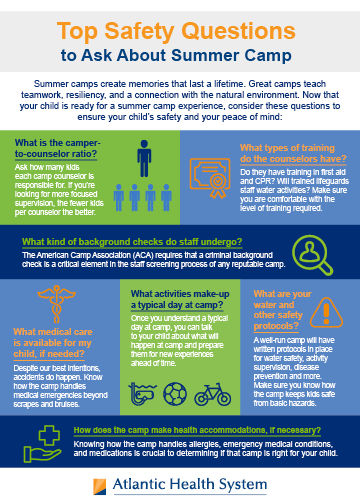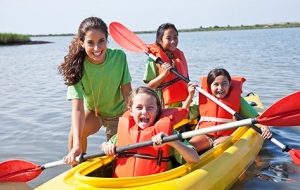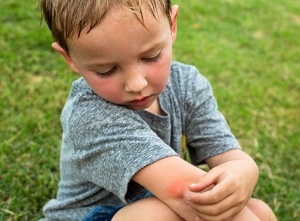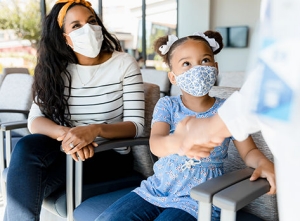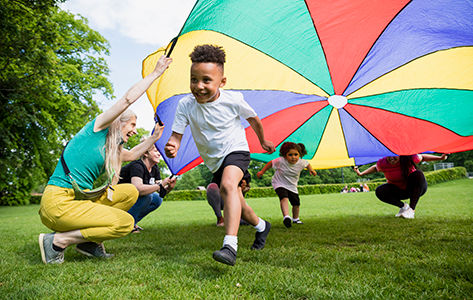
Summer camps create memories that last a lifetime. The benefits of attending camp are numerous -- making new friends, learning new skills, and building confidence and self-esteem. Great camps also teach kids teamwork, resiliency, and independence. All it takes to ensure your child’s experience is a positive one, is a little planning before camp begins.
For children who want to stay close to home, a day camp is a great place to start. Kids looking for more freedom and independence might benefit from a sleepaway camp. Multi-experience camps will expose your child to numerous activities. Specialty camps will focus on a child’s specific interest or passion such as art, sport, science, or nature.
Set Expectations with Your Child
Whatever kind of camp you choose, it’s important that your kids are safe and healthy while they’re away from home, and sometimes that takes a little planning for parents,” says Laura Criscenzo, DO, a pediatrician with Atlantic Health System. “Talk to your child ahead of time about what will happen at camp, so they’re prepared for this new experience – both physically and emotionally.”
- Go over the camp schedule together to relieve nerves and help your child feels comfortable.
- Review the camp’s rules and requirements to help ensure your child is prepared and understands expectations.
- Decide what to bring together. Pack water bottles, sunblock, snacks, a rain jacket, a bathing suit, whatever the camp recommends for activities and weather.
- Practice certain skills ahead of time with younger kids such as taking off a wet swimsuit or buckling a school bus seatbelt.
- Encourage your child to make new friends, try new foods and activities, and be helpful to the counselors.
- Make sure your child is physically fit for the activity level of the camp.
- Schedule your child’s annual physical in advance and make sure all immunizations are current.
Did You Know?
Parents and legal guardians can connect their personal MyChart account to their child's medical information by setting up proxy access.
Use it to download your child's vaccination records, message your doctor and more.
Connect With Your Pediatrician
After enrolling your child in a camp, you typically need to provide some health documentation. Here is a list of the information most camps require from you and your pediatrician before your child arrives.
- A recent physical exam by a medical professional
- An up-to-date immunization schedule
- A consent-to-treat form in case your child is injured while at camp
- If applicable, a detailed health history for illnesses, allergies, or medical concerns that may need attention
Get the Answers You Need from Camp Staff
“The best camp environment is one where trusted, caring, well-trained adults set safe boundaries for kids,” says Dr. Criscenzo. “By asking a few simple questions, parents can gain a better understanding of how much emphasis a camp places on health and safety.”
- What is the camper to counselor ratio?
- What types of medical training is the staff required to have?
- Does the staff undergo background checks before hiring?
- What kind of medical care and equipment is available on-site?
- How does the camp make medical accommodations when necessary?
It’s important to know, in advance, who will administer care to your child in an emergency. If appropriate, discuss your child’s medical conditions in advance with staff and provide them with any medications needed, labeled clearly with your child’s name, dosage, and frequency.
For example, if your child has severe allergies or asthma, give the staff a written action plan before camp begins along with a photo of your child. Make sure the staff is trained to use any devices your child might needs such as an EpiPen or an inhaler.
“Camp helps children mature, learn life skills, and form lifelong memories and friendships,” says Dr. Criscenzo. With a little planning, parents can set their child up for a summer that’s safe and lots of fun.”
Be Proactive About Their Health
Kids create memories that last a lifetime during summer camp. Our pediatricians are here to guide you so your child can have a safe and fun camp experience.
Related Articles
Your Healthy Summer Guide
Atlantic Health System is your healthy summer guide to a safe and fun season. From helpful tips to preventive and urgent care, we've got you covered for whatever summer brings.
5 Ways to Play It Safe at Summer Camp
Camp activities come with safety precautions. Here are five ways your little camper can play it safe while away from home.
Three Common Summer Skin Rashes in Kids, What You Need to Know
Childhood rashes from plants, bugs and infections are common during summer months -- and kids tend to scratch the itch, often unknowingly. Here’s how to prevent and treat three common rashes and make sure they don’t become something more.
Help! Where Should I Take My Child for Care?
Unexpected accidents and illnesses happen all the time – so make sure you know where to go when a health emergency strikes.
If It Hurts, Don't Play Through the Pain
Playing sports when you’re hurt is never a good idea, especially for young people whose bodies and brains are still developing. Pain from any injury is the body’s way of telling us to rest and recover. Here’s how to make sure your child is playing it safe.
How to Be Better Prepared at a Child’s Sporting Event
In professional sports, trained personnel are ready to respond if there’s a medical event. But what about at your child’s sporting events? Here, we share some easy ways to prepare in case of a health emergency.
